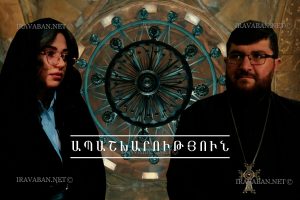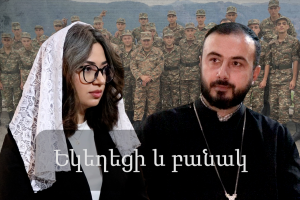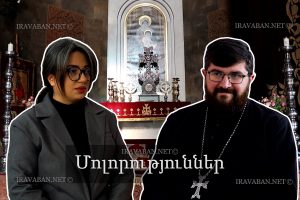After receiving the gift of speaking in tongues, the apostles of Christ spread throughout the world to spread the light of God and Christianity. The spiritual pastor of the Holy Cross Church of Arabkir of the Ararat Patriarchal Diocese, Father Partev Muradyan, said this within the framework of Iravaban.net’s “The Church and the Law” series of interviews
– When and how did Christianity enter Armenia?
– The apostles Thaddeus and Bartholomew came to Armenia, and here is where the entrance began. They are considered to be our first enlighteners who came and brought the light of Christianity to Armenia. Then, with the light given to us by Gregory the Illuminator, Christianity became the state religion and spread throughout Armenia.
– The opinion that Christianity, coming to Armenia, erased and eliminated the pagan culture, is widely circulated. What can you say about this?
– Christianity enlightened us and by enlightening, created the Christian church and the church that still preserves all our national traditions: beginning from the holidays to the most beautiful national traditions preserved in the church.
I think the structure that preserves national holidays and traditions can never destroy culture. And when we look at our history, all our historians and especially cultural figures grew up in the church and were mainly clergymen, because the clergy, having the church as their leader, valued the national-church connection more. I think that such a church cannot directly destroy culture.
– How long did it take for Christianity to spread in our country?
– From the first century, Christianity began to root in our country, and we know the already known cases related to Gregory the Illuminator, through whose miracle it has already begun. It spread very quickly in our country. I think it was God’s providence that a country that longed for enlightenment got it quickly.
– What are the stories and traditions related to the spread of Christianity and becoming a state religion?
– It is the story of forty virgins who come to Armenia to find shelter because they were persecuted for being Christians at that time. Before that, Gregory the Illuminator, who was the son of the prince who had killed King Trdat’s father, had served King Trdat. He was educated in Caesarea, where he was enlightened and converted to Christianity. The king did not know about this, but during a ceremony where sacrifice should have been made to a false goddess, Gregory the Illuminator refused, which revealed his Christianity and also revealed who he was. That is why he was thrown into a ditch as a death penalty, where people who were to be put to death were thrown.
After this incident, the virgins came to Armenia and lived in Vagharshapat, which was the capital at that time. The king, learning about the virgins, especially when he saw the virgin Hripsime, whom he fell in love with, wanted to marry her, but the king was a pagan, and the virgin Hripsime had sacrificed herself to Christ and rejected the king, causing the king’s anger. And the king commanded that all the virgins should be put to death. After this incident, the king fell ill with a very bad illness, and the king’s sister had a dream in which it was said that only Gregory could heal.
The king was skeptical at first, because it had been 13 years since Gregory the Illuminator was thrown into the ditch and no one could stand there for more than a few days, but he sends a man and, to everyone’s surprise, it turned out that Gregory was alive. He was taken out of the ditch, Gregory healed the king. After this miracle, the king awakened with the desire for enlightenment. He and the whole court, then the whole nation were baptized and became Christians.
– Armenian Apostolic Holy Church․ When did it separate from other Christian churches, and why?
– Until the 5th century we had one common cosmic church, which was the inheritor of all apostolic traditions. And in the 5th century, the Council of Chalcedon took place, where the churches divided, but for reasons known to us, no representative from Armenia could be present at that time, but later, when the meeting material was sent, our church refused to accept this view and remains faithful to Christian great cosmic church. And to this day our church preserves all the apostolic traditions that we have inherited from Christ.
– From when did the church become a national structure and play a significant role in preserving national values?
– I think that since the adoption of Christianity, since its spread, the church is not only a spiritual structure, but also a cultural and national structure, because the church, the clergy, the clergymen have realized from the beginning that an educated person can only be faithful to his values. And they were aimed at preserving those values, because from the early Christian period there were already educational schools in all our monasteries, where people were educated.
I mentioned a while ago that all our historians are mainly clergymen, because they have realized and valued that in order to keep the face of the nation, we must have literature, history and culture. And all of this is as valuable as religion and Christianity. Since this realization they have been aimed at development.
It was also a consequence that we had the invention of letters, because at one time our patriarchs and saints, Sahak Partev and Mesrop Mashtots, realizing that it was already the time for Armenians to have their own writing along with educational complexes and the spread of Christianity, Armenians should have their own script, with which they can also write, read, learn in Armenian, they gave a boost to the invention of letters. Armenians began to pray in Armenian.
– Father Partev, at the end of the conversation, let’s talk about what role the church can play and what it can do to overcome the current divisiveness and social polarization in the society, based on the lessons learned from similar situations in its history.
– When we say church, we mean all the children of the church, the Christian believers, who are an integral part of the church. That is, if the church is to do something, the whole church, the building, the clergyman and the believer must do it together. The most important thing we need to do is renew our covenant with God.
The covenant from which we often break by our own will, not fulfilling the messages that God has entrusted to us, because by reciting those messages, we bring our loyalty and trust in God. It seems to me that we need to renew that loyalty and trust.
And let us, by trusting in God, fulfilling the messages, filling each other with respectful love and kindness to one another, correct the gap that has arisen in us after leaving God and His messages. By doing all this, we can be reunited, bringing our loyalty and trust in God, with which, I am sure, we can only find kindness.

















